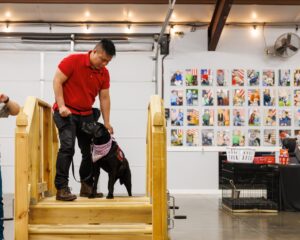Why would you have a hospital on a ship? And if you have one, why not two?…
Service Dogs: More than cuddles. They are capable.
By CJ Stevenson, Program Officer
Fall – what every Texan looks forward to about three days into June. Cooler weather, heavy knit sweaters, pumpkin piles – personally, it’s one of my favorite times of the year. September is coming and it not only kicks off the fall season in the South, but September is also home to National Service Dog Month – a month dedicated to celebrating the amazing work, companionship and independence service dogs offer.
We’ve all been there – you spot a golden retriever at the other end of the aisle at the grocery store. “Be cool,” you tell yourself as you eye their service dog vest with a very prominent “DO NOT PET” patch. Maybe you nod at the human, or turn away because the temptation to pet that adorable creature is too strong. Regardless of your response upon encountering a service dog, there is a lot the lay person doesn’t know about service dogs and just how amazing they truly are.
1). Service Dogs are literally bred to do their job.
The training process to become a service dog is ruff. In all seriousness, very few puppies from each litter complete training to become a certified service dog who is then matched with a human. There’s a great documentary called “Pick of the Litter” that follo ws a litter of puppies as they try to become guide dogs for the blind and visually impaired.
ws a litter of puppies as they try to become guide dogs for the blind and visually impaired.
The service dog industry as a whole has gone through many iterations in its attempt to figure out the correct formula to produce a successful service dog. Many started with rescue dogs, but the success rate was low. Then, dog breed was considered and Labrador Retrievers were shown to be the best suited for the work. And finally, many agencies have turned to purpose-bred programs, which means that two dogs are bred based on their genetics and temperament to increase the likelihood of success within the litter of puppies. This is done under the direction of a highly qualified team with robust breeding program protocols. This process takes time, but agencies have been able to dramatically decrease health problems such as hip and elbow dysplasia through purpose-breeding.
Many universities have also taken an interest in the genetics of what makes a successful service dog – the most notable being Duke University and its Duke Canine Cognition Center.
2). Service Dog training programs help to rehabilitate incarcerated persons.
Service dog training programs are growing in popularity among correctional facilities of low level offenders. What this typically looks like is service dog training organizations partner with a correctional institution to temporarily match inmates with a service dog in training. The inmates receive training from the agency, and the dogs receive training from the inmate. Not only is the recidivism rate among inmates in the service dog program very low, but the inmates learn skills that can help them access employment once they are released.
3). If you see a loose Service Dog, follow it.
This is a PSA on behalf of all service dog training organizations, and something I just recently learned myself. If you encounter a service dog that is not accompanied by a human, you need to follow the service dog. Service dogs are trained to find someone if their human becomes incapacitated then lead that person back to their human for help. Call 911 and stay with the person and the service dog until help arrives.
4). There’s a shortage of puppy raisers.
A recent press release from Canine Companions, a service dog training organization, stated: “A global shortage of volunteers to care for puppies and dogs in training could severely impact the lives of people with disabilities, according to Assistance Dogs International (ADI).” The demand for service dogs is at an all-time high, which means more people are needed to raise the puppies and dogs in training who will one day become service dogs. The same news release shared that at the end of 2022, almost 9,000 clients were waiting for a task-trained dog.
There are a number of ways to help this backlog through volunteering. Puppy raisers are the highest need for most agencies, but you can volunteer your time in other ways by cleaning kennels, helping with events, or answering phones. Start by checking out two service dogs agencies located here in North Texas: Canine Companions, and Patriot Paws.
5). It’s a crime to falsely claim your pet as a Service Animal – and hurts their reputation.
Not only is it a crime to falsely represent your pet as a service animal, but pets posing as service dogs harm the reputation of certified service dogs who have public access rights. As previously mentioned, becoming a certified service dog is a long and challenging process, but those select few who make it through training, are awarded legal protections that guarantee them public access. Public access means the ability to freely enter public spaces with their human – restaurants, airplanes, public transit, stores, etc. Certified service dogs are given these rights, because without them, their human would not be able to independently navigate such areas. These dogs are trained to open doors, push grocery carts, pick up items, and so much more. The problem is when someone falsely claims their pet is a service dog in order to gain public access, and the pet misbehaves. This creates a negative stigma for all service dogs and makes it harder for those with disabilities to navigate public life.
The Rees-Jones Foundation has supported two service dog organizations working in North Texas since 2011. Canine Companions provides service dogs to children and adults with disabilities as well as veterans. Patriot Paws provides service dogs to veterans.
So this fall, as you enjoy your pumpkin-spiced beverage of choice or sit down to your favorite football game, tip your hat to the sweet creatures who have earned the right to be called service dogs.
Share this post:
Category: Uncategorized
Power of Place-Based Investments Can Lead to Better Outcomes for Children By Trey Hill, Senior Program Officer…
Why Home Mentoring is Key to Child Abuse Prevention By Ona Foster, CEO of Family Compass [In…

